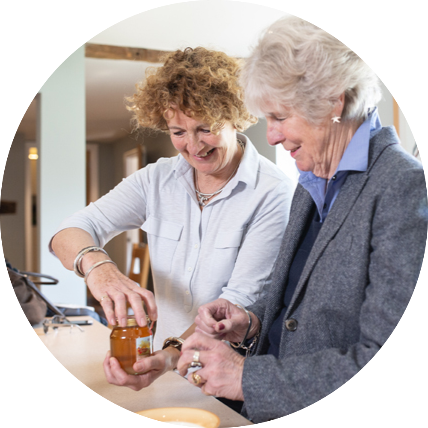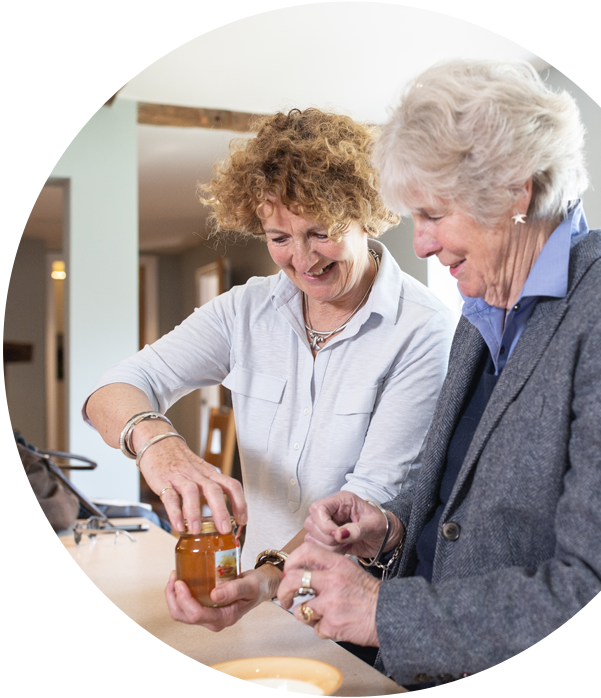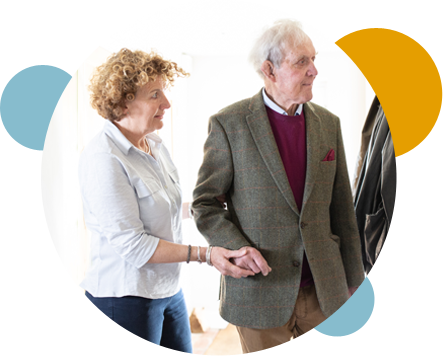What is live-in care?
For people with ongoing or complex care needs, live-in care is when a carer lives with you in your own home, providing a direct alternative to nursing or residential care homes.
Our live-in carers are professionals expertly trained to look after and provide flexible care to individuals or couples in their own homes. Our clients typically have a team of two carers who take it in turn to live with them. When one of our live-in carers arrives at the client’s home, they have a handover with the previous carer.
Find out more about our award-winning live-in care service rated ‘Outstanding’ by the Care Quality Commission.
What does a live-in carer do?
Discreet and sensitive personal care
Our expertly trained carers can provide sensitive and respectful personal care focused on ensuring dignity and independence. This could include assisting with personal hygiene, dressing, toileting and other personal care tasks such as putting on makeup, that allow you or your loved one to feel tip top every day. Our carers will encourage you to remain as independent as you can, whilst providing the gentle encouragement and dignified support you need to keep on top of your personal care routines.
Specialist care for complex conditions
Live-in carers must be suitably trained and qualified to manage or administer medications. At The Good Care Group, all of our carers undertake this important training as part of their induction.
People living with ongoing medical conditions such as dementia, cancer, Parkinson’s disease or multiple sclerosis may require expert medical care. A suitably trained and qualified live-in carer can provide specialist care to individuals in the comfort and familiarity of their own home, whilst additionally offering emotional support and reassurance to their family.
Our professional live-in carers can even undertake clinical tasks such as managing PEG feeds, blood sugar monitoring, administering oxygen and managing catheters or stomas. Our Specialist Care Service for complex care means that care is overseen by our Specialist Nurse, Dr Jane Pritchard, and Clinical Lead, Sabah Shah. They provide expertise, guidance and support to our clients and their families.
Live-in carers will often liaise with medical professionals, coordinating appointments, sharing important information, reporting changes to symptoms and so on. Observing subtle differences to condition is something that live-in carers are well placed to do due to their close proximity to and detailed knowledge of the person they are caring for.
Dementia care
Caring for a loved one who is living with dementia can at times feel overwhelming. A live-in carer can provide the specialist care and assistance required to look after a person with dementia. They can provide them with the companionship and routine needed to maintain well-being whilst preserving their dignity and independence. A live-in carer may help a person with dementia with tasks such as bathing and personal care, assistance with mobility and taking care of medication and nutritional needs.
Dementia is not a normal part of ageing and as such dementia care requires a very special skill set. Being able to see the world from the perspective of the person with dementia is important. Establishing a common language, proactively making use of older memories, understanding behavioural expressions of need, and anticipating and avoiding distress are skills that only the very best dementia carers will have.

Meeting nutritional and dietary needs
A balanced and nutritious diet and the intake of adequate fluids are essential for maintaining a healthy lifestyle. As a result of the natural ageing process or a medical condition, many older people experienced reduced appetite, a loss of interest in eating or may need assistance with eating. This can make it difficult for them to get the proper nutrition they need to feel their best.
Understanding nutrition is also an essential duty of being a live-in carer. Some medical conditions require particular diets or certain ways of preparing foods. People with dementia often require diets which are highly colourful or that they can eat easily with their fingers.
Texture-modified diets for people with swallowing difficulties must be prepared to exact specifications, too little or too much pureeing can pose more risks. People living with conditions like MS or cancer may have extremely specific diets that live-in carers will understand and be able to deliver.
Our live-in carers can provide support with planning food, helping with shopping for groceries, and preparing your favourite healthy meals. They will respect your food preferences and help ensure that you or a loved one are getting enough to eat and drink.
Most of all, our live-in carer can help you enjoy food. A home cooked meal, prepared to your preferences and served in your home among good company, can do wonders for health and well-being.

Relief from the burden of everyday domestic tasks
Our live-in carers can carry out a wide range of domestic tasks to enable a person requiring care to relax in a home that is clean, comfortable and secure. The everyday services that a live-in carer might provide include, but are not limited to:
- Cleaning and tidying the house
- Washing dishes
- Cleaning and changing bed linen
- Laundering and ironing clothes
- Gardening
- Shopping
- Meal preparation
- Arranging trips out
- Help with simple administration such as paying bills
- Pet care
Friendly companionship and emotional support
One of the most important and valued aspects of a live-in carer’s role is providing companionship and emotional support. For many people with live-in carers, simply having someone friendly on hand to chat with about their opinions and experiences can improve their happiness and quality of life immeasurably.
In cases where friends or family are able to visit only intermittently or are absent altogether, a live-in carer can be a best friend to the person receiving care. Sharing quality time with an understanding and caring friend is both comforting and therapeutic.
In this capacity, a live-in carer can become a trusted companion with whom to enjoy recreational activities such as trips to the cinema, theatre or social club; take short breaks with; play cards or games or share a hobby with. They may simply be someone that the person receiving care may relax and chat with over a cup of tea.
Security and peace of mind for the entire family
Above all else, our live-in carers provide security and peace of mind for those they care for and their families. Knowing that a fully-trained, compassionate and trustworthy live-in carer is always around to ensure continued well-being and safety, and who can respond quickly and appropriately in the event of an emergency, is immensely reassuring for all the family.
Considering live-in care?
We know there is lots to think about when considering live-in care for the first time. If you have questions, do not hesitate to contact our friendly advisors. They can provide impartial support and guidance on the options available to you and your family.
We can also arrange for a free, no-obligation consultation at your home or in hospital if you are awaiting discharge. During the consultation, a local care manager will meet with you and your family to discuss your care needs in more detail.
Talk to us about your care needs
To talk about your care needs, contact one of our friendly advisors. Calls from landlines are free.


